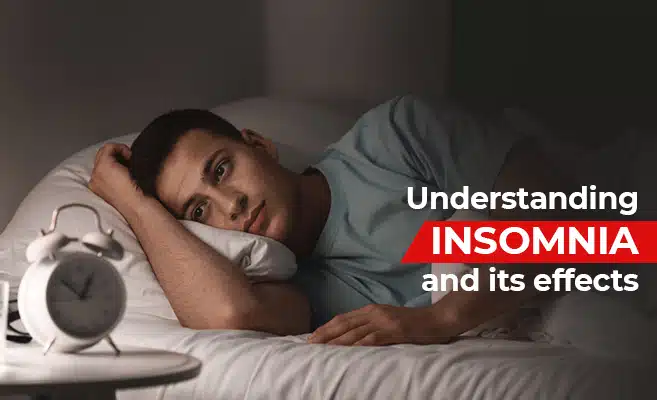Understanding Insomnia and Its Effects

You may find it difficult to go to sleep, to stay asleep, or you may wake up too early and find it difficult to go back to sleep. This may be Insomnia, a common sleep ailment. When you awaken, you might still feel exhausted due to Insomnia disorders. Your health, productivity at work, and quality of life can be negatively impacted by Insomnia in addition to your energy and mood.
Adults typically need seven to eight hours of sleep every night, however, this might vary from person to person. Most individuals ultimately experience short-term (acute) Insomnia, that may last for a few days or even a few weeks. It is frequently the outcome of stress or a traumatic occurrence. However, some people suffer from long-term (chronic) Insomnia that lasts for a month or longer. It’s possible that Insomnia is the main issue, or that it’s a side effect of other treatments or prescription drugs.
Classifications of Insomnia
There are two categories of Insomnia: primary and secondary.
Typical Insomnia
This suggests that there is no connection between your sleep cycles and any other medical ailment.
Second-degree Insomnia
It indicates that you have problems falling asleep due to a medical condition (such as asthma, depression, arthritis, cancer, or heartburn); pain; medicine; or substance usage.
Other Kinds of Insomnia
Below are the following kinds of Insomnia:
Sleep-onset Insomnia
This indicates that you have problems falling asleep.
Sleep-maintenance Insomnia
This occurs when you have problems falling asleep or waking up too early.
Mixed Insomnia
You have problems going to sleep and remaining asleep all night when you experience this kind of Insomnia.
Paradoxical Insomnia
The amount of time you spend sleeping is underestimated when you experience paradoxical Insomnia symptoms. Compared to how much sleep you get, it feels like much less.
Insomnia Symptoms and Causes
Insomnia may be a major problem or it may be a sign of other illnesses. Chronic Insomnia symptoms are frequently brought on by stress, traumatic experiences, or sleep-disturbing behaviours. Insomnia can be cured by attending to the underlying cause, although it occasionally persists for years. Chronic Insomnia has a variety of reasons, including:
Stress
It might be tough to fall asleep at night if you have worries about your family, finances, health, or job.
Work or travel plans
Circadian rhythms serve as an internal clock for your body, controlling functions including metabolism, body temperature, and sleep-wake cycles. Insomnia symptoms can result from a disruption of your body’s circadian cycles.
Unhealthy sleep patterns
An erratic bedtime routine, naps, stimulating activities right before bed, an unpleasant sleeping environment, and using your bed for work, eating, or watching TV are all examples of poor sleep habits.
Overeating late at night
A small snack before bed is acceptable, but if you consume too much, you can feel physically uneasy when you lie down.
Other factors that may contribute to chronic Insomnia symptoms include illnesses or drug usage. The medical problem may be treated, which might lead to better sleep, but Insomnia may still exist.
Other typical reasons for Insomnia include
Mental health conditions
Anxiety problems like post-traumatic stress disorder, for example, may keep you up at night. An early awakening could indicate sadness. Insomnia is a common symptom of several mental health problems.
Medications
Numerous prescription medicines, including certain antidepressants and treatments for asthma or high blood pressure, can disrupt sleep.
Sleep-related disorders
Your breathing stops periodically throughout the night if you have sleep apnea.
What are The Causes of Insomnia Risk Factors?
Women experience Insomnia more frequently than males. Sleep disturbances during pregnancy might be caused by hormonal changes. Their bedtime routines may be impacted by other hormonal changes, such as premenstrual syndrome (PMS) or menopause. Insomnia is a condition that grows more common as people age.
Treatment for Insomnia
You might not require therapy if you have brief Insomnia symptoms. A moderate case is frequently treated with excellent sleep hygiene and self-care. Here are some advices for a better sleep at night:
- Daytime sleep should be avoided.
- Dedicate your bedtime for sleeping, not for lounging.
- Decide on a regular time to go to bed.
- Exercise
Your doctor could suggest using sleeping drugs for a few weeks. If you still have problems concentrating throughout the day as a result of poor sleep, sedatives, mild tranquilisers, and anti-anxiety medications are a good SOS. Almost all of these medications are safe when used under a doctor’s supervision. If not taken as prescribed, several sleep aids can become a habit or increase the risk of overdosing. Certain modern sleep aids can be used for longer periods without losing their efficacy.
Treatment for any underlying medical ailment – if you experience persistent Insomnia – may improve your ability to sleep. Behavioral therapy may be recommended by your doctor – it’s very helpful.
Conclusion
Don’t be afraid to consult your doctor for assistance if you are experiencing Insomnia disorders. The best answers for all of your sleep concerns are available at PSRI Hospital. With a dedicated team of doctors and all the wherewithal, they’ve got you covered with their services.

 Book An Appointment
Book An Appointment Virtual Consultation
Virtual Consultation





